Scientific
Inquiry Process
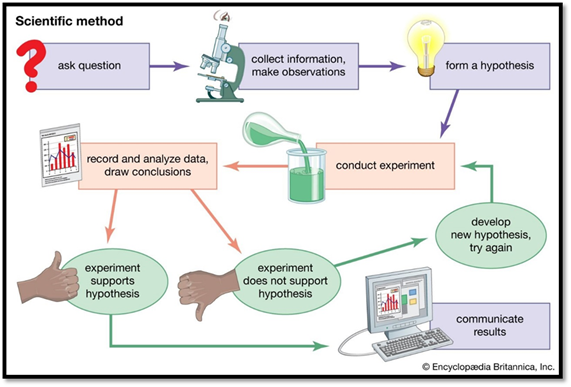
The scientific method is
the process scientists follow to solve problems. Scientists spend much of their
time conducting experiments and carefully recording, analyzing, and evaluating
the data from experiments. If the data does not support a hypothesis, scientists
must form a new hypothesis and conduct new experiments. When the data supports
a hypothesis, scientists share their results with other scientists.
Scientific
Experiments
What does it mean to be a scientist?
You may have seen TV or read books about what
scientists do. For instance, Neil deGrasse Tyson is
a popular American scientist who studies stars and planets—and often appears on
television.
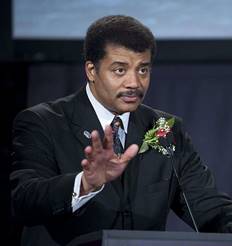
Neil deGrasse Tyson
You may also know someone who is a scientist.
Maybe you have even done science experiments yourself.
In this stage, you will learn what scientists
do and how they conduct experiments.
Scientific Inquiry
Process
Even if you do not want to be a scientist for a
career, you can still think like a scientist using the scientific inquiry
process.
Scientific
inquiry is
how scientists study the world and make explanations based on what they find
out from their studies.
Watch the Scientific Inquiry Process video to
explore how it works.
Let's Practice
Asking Scientific
Questions (1)
Watch the demonstration with an egg in a bottle
below.
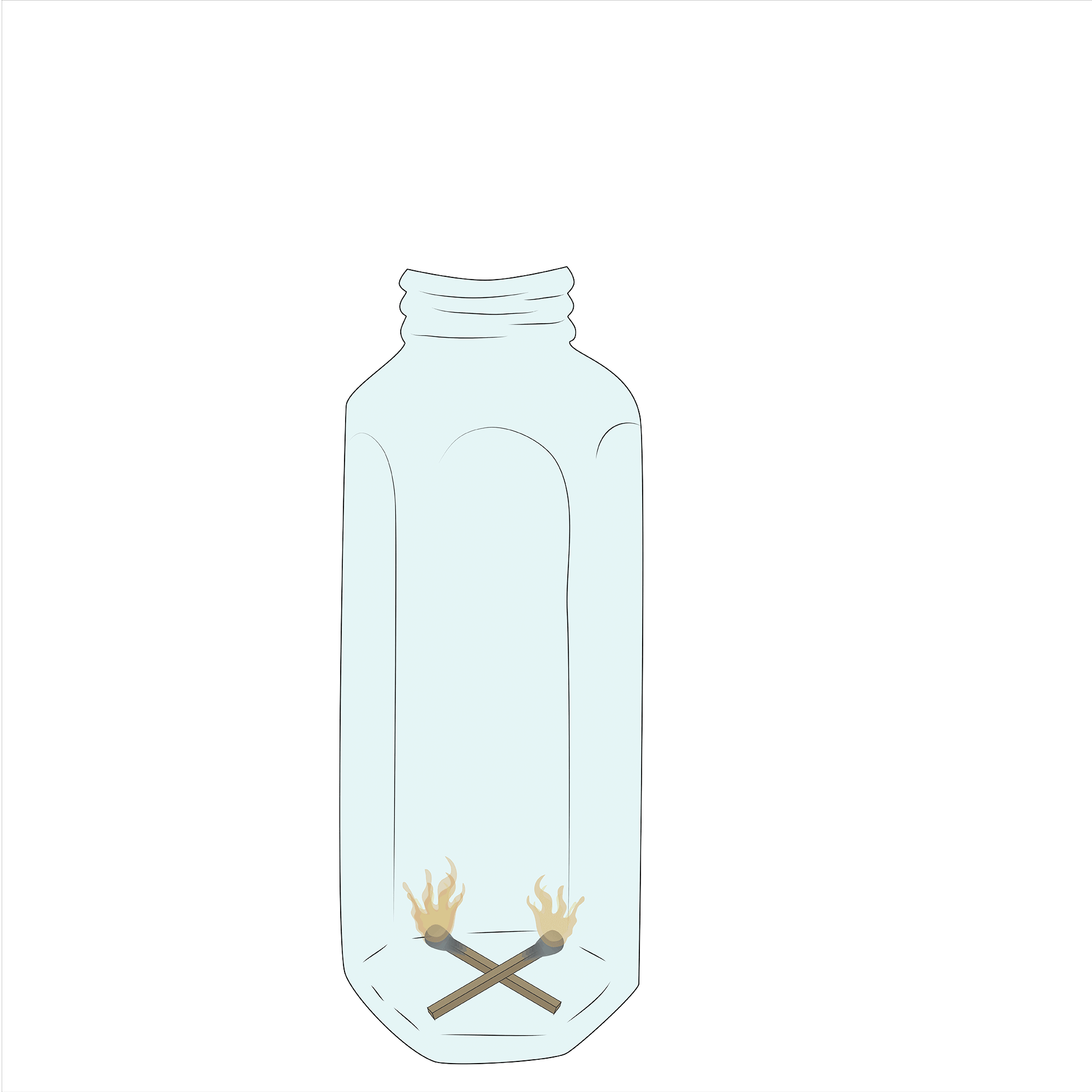
In your science
journal,
write one sentence to explain what happened in the demonstration.
What are three questions you have about what you
saw?
1.
2.
3.
What do you think it means for a question to be
testable?
Check It Out
In science, some questions are better than
others. Scientists are good at coming up with simple questions that can be
tested. The answers to these questions help explain how things work and can
make life better on Earth.
Scientific questions describe a problem and
can be tested using scientific inquiry.
Good scientific questions:
- Can
be tested by an experiment or measurement (like temperature,
time, distance, height, or weight)
- Build
on what you already know
- Are
not personal opinions
- Lead
to other important questions
Background
Research (2)
Imagine you have been asking your parents or
guardians for a pet for quite a long time, and they agreed to get you a bird.
But before getting the bird, they tell you to learn how to care for your bird.
The first question you may have is: What do birds eat?
This is not the best scientific question, but
you still want to know what birds eat.
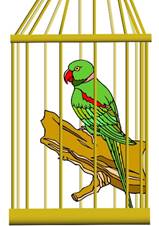
Pet Bird
In your science
journal, answer the
question:
1. How can you find
information about what birds eat?
Read and
Discover
You can ask people, read books, or search
online to find information. These activities are known as background research.

Student Researching Online
Background research is an important step in the
scientific inquiry process because it helps researchers learn what is already
known and ask better questions. Scientists start by looking at similar
experiments done in the past and seeing how other people have answered similar
questions. With this background information, they can plan their experiments
and activities.
To do background research, you can begin by
asking your questions to people who may know the answers. It is also important
to find information at the library or online.
Writing a
Hypothesis (3)
Once you have asked a testable question and
done some background research, the next step in the scientific inquiry process
is to write a hypothesis, or your
best guess, to answer the question.
Look at the image of three plants. In
your science journal, write a hypothesis about
why you think the plants are of different heights.
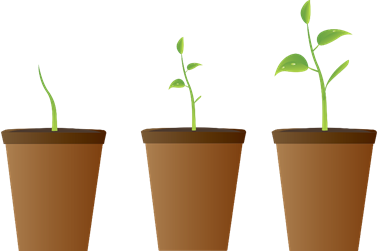
Plants of Different
Heights
Check It
Out
To investigate, you need a way
to measure how things changed. Then you can tell what happened when
you changed things compared to what would have happened otherwise. Variables
are used in experiments.
·
Independent variable: what you are changing or testing in an
experiment
·
Dependent variable: what you are measuring in an experiment.
Watch the video below, then complete the Let's
Practice.
Let's Practice
Most experiments also have controlled
variables. Controlled variables are
the parts of the experiment that are not changed. For example, to investigate
plant growth, you might change the water but keep the dirt and sunshine the
same.
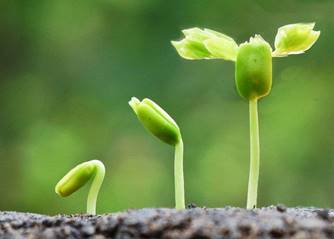
Plant Experiment
If you are not sure which variable is which,
ask yourself:
- "What
is being changed?" (independent variable)
- "What
am I measuring?" (dependent variable)
- "What
am I not allowing to change?" (controlled variable)
Once you know the independent and dependent
variables (and how you will measure them), you can use them to form a
hypothesis.
A hypothesis
is an "If … then" statement, such as: "If the air becomes more
polluted, then more people will get sick." The independent variable is the
"if" part (amount of pollution), and the dependent variable is the "then"
part (number of people who get sick). Here are some tips to tell if you have a
good hypothesis:
- It is
your best guess for answering a testable question
- It is
in the form of an "If … then" statement
- It says
how an independent variable will change a dependent variable
- It
can be tested with an investigation
Which
Hypothesis is Best?
|
Question |
Hypothesis |
Best
Guess |
“If…then"
Statement |
Independent
Variable Changes Dependent Variable |
Testable |
|
What effect does using plant
food (fertilizer) have on plant growth? |
Fertilizer makes plants grow
faster. |
Yes |
No |
Yes |
Not testable (it is written as
a true statement) |
|
Does aspirin have a faster
headache-relieving effect than ibuprofen? |
Do headaches go away more
quickly with aspirin or ibuprofen? |
Yes |
No |
Yes |
Not testable (it is written as
a question) |
|
Do students who get at least 8
hours of sleep have better test scores than students who don't? |
If students get 8 hours of
sleep, they have better scores than those who do not. |
Yes |
Yes |
Yes |
Testable (it is an "if…then"
Statement) |
Planning
and Conducting Experiments (4)
One day, there is a big rainstorm. You go to a
nearby lake and find that many fish have died. You suspect poison got into the
lake accidentally or on purpose and killed the fish.
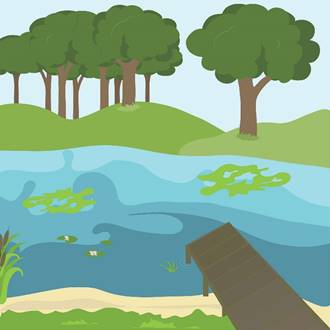
Lake After a Rainstorm
In your science journal, answer the
questions:
1. Thinking like a
scientist, what experiments could you do to solve the problem?
2. What would be your
testable question?
3. What would be your
hypothesis?
4. Why would it be a bad
idea to add chemicals to the lake to see what happened?
Read and
Discover
To test a hypothesis, scientists do experiments. Scientific investigations
can answer other questions involving observing or looking at information others
have already found.
The main purpose of an experiment is to gather
information to show if your hypothesis was right or wrong. This information is
in the form of evidence or data.
It is important to think carefully about the
steps of your experiment before you begin so that you know it will give data to
answer your question.
Imagine that you want to
learn about the effect of acid rain on plant growth. You ask a testable
question and form a hypothesis:
Testable Question: How does acid affect
plant growth?
Hypothesis: If a plant receives more
acid, then its roots will not grow as long as the roots of a plant that
receives no acid.
When planning an experiment, it is a good idea
to write down everything you will do, starting with a title and a testable
question. An Experiment Lab Sheet helps
you plan and carry out an experiment. After the experiment is done and the lab
sheet is filled out, you have a record of what you did, and other people can
see the results of your tests.
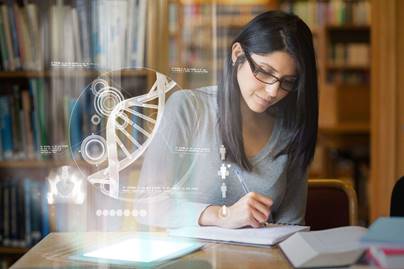
Student Planning an
Experiment
Part of planning is deciding what information
you will collect and how you will collect it.
For a good plan, you will need to know:
1. What are your independent, dependent, and controlled
variables?
2. What measurements will you take?
3. What materials will you use?
4. What steps will you follow?
The variables in the plant experiment are the amount
of acid (independent variable), length of root growth (dependent variable), and
amount of water and light (controlled variables).
Check It
Out
Once you have planned the experiment, you are
ready to carry it out. As you experiment, you write down everything that you
observe and measure. This information is called data.
Collecting
and Analyzing Data (5)
In most investigations, scientists make
observations and collect data to answer important questions. A good way to
collect data is with a table.
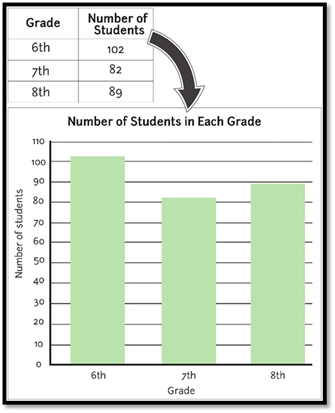
Data Table and Graph
When you are done collecting information, you
can analyze the data by counting the numbers in the table—and showing them in a
graph, table, or chart. These methods visually present information.
In your science
journal,
answer the following questions based on the "Data Table and Graph."
1. What is the topic of the table?
2. Which grade level has the least number of
students?
3. Which grade level has the greatest number of
students?
Reporting
Results (6)
You explain what your inquiry tells us when you
report
results using graphs, tables, and your Lab Experiment Sheet.
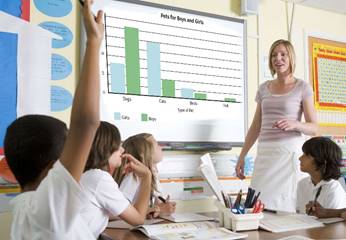
Teacher Presenting Data
In your science
journal,
answer the following question.
1. What else could you do to report the results
of an investigation?
It helps when you write the results section concisely and in an orderly and logical way.
Look at all the data you've collected. Figure out what relates significantly to
your hypothesis and the predicted answer to the question you are trying to
answer. This will help you to be clear and objective when describing your
results.
Let's Practice